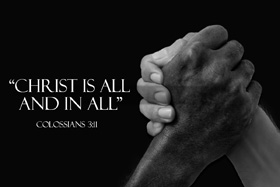Key points:
• Learning about Black experiences opens up understanding of white privilege.
• “I know I must participate” in changing systems that have harmed others.

Photo courtesy of the author.
Commentaries
But in looking back, one reality stands out that seemed unbelievable a year ago: my white privilege. I discovered how privileged I am and how my privilege has affected others negatively. In May 2020, when so many violent Black deaths seemed to occur all at once, our Sunday school class was meeting on Zoom. We talked about our horror at these events and our shock that these things are still happening.
One of our members is Black and the mother of two daughters. She burst into tears because she has had to tell her daughters that they are not safe because they are Black. She went on to share numerous events in her life when she or her husband had been treated in racist ways.
This is a person I love, one who has brought so much knowledge and diversity to our fellowship. I was stunned, and I began to read and listen to all the voices around us that have been trying to make us aware of white privilege. It has humbled me and made me question the very structures of our society I have always taken for granted.
I read several books, including one recommended by the Holston Conference: "I am Black, I am Christian, I am United Methodist." The voices in this book are those of our Christian leaders who happen to be Black.
We Are God's Family: Personal Encounters with Racism

Another book that has influenced me is "Love Is the Way" by Bishop Michael Curry, presiding bishop of the Episcopal Church. His memoir is filled with wisdom and love. Late in the book, he says, “Plenty of good people hold tight to the belief that American society is colorblind because to believe otherwise is far too painful. Their ignorance, in turn, causes great pain.”
I cannot ever take the systems that have nurtured me for granted again because they have had the opposite effect on so many. I know I must participate in changing these systems. This would have seemed unbelievable to me a year ago.
Derr is a member and the mobile food pantry coordinator at First United Methodist Church of Farragut in Knoxville, Tennessee. This commentary originally appeared on the Holston Conference website.
News contact: Joey Butler or Tim Tanton at (615) 742-5470 or [email protected]. To read more United Methodist news, subscribe to the free Daily or Friday (weekly) Digests.
Like what you're reading? Support the ministry of UM News! Your support ensures the latest denominational news, dynamic stories and informative articles will continue to connect our global community. Make a tax-deductible donation at ResourceUMC.org/GiveUMCom.



